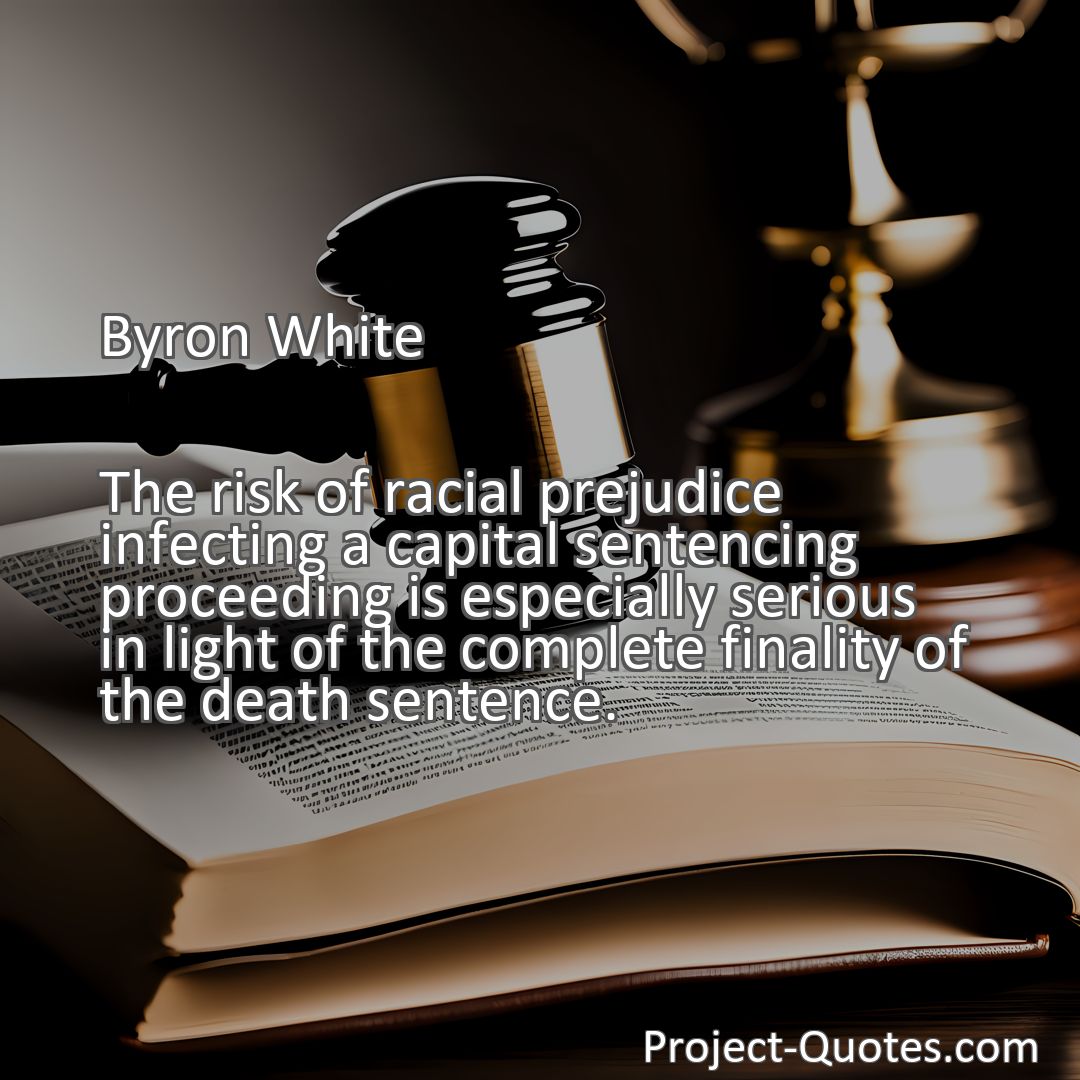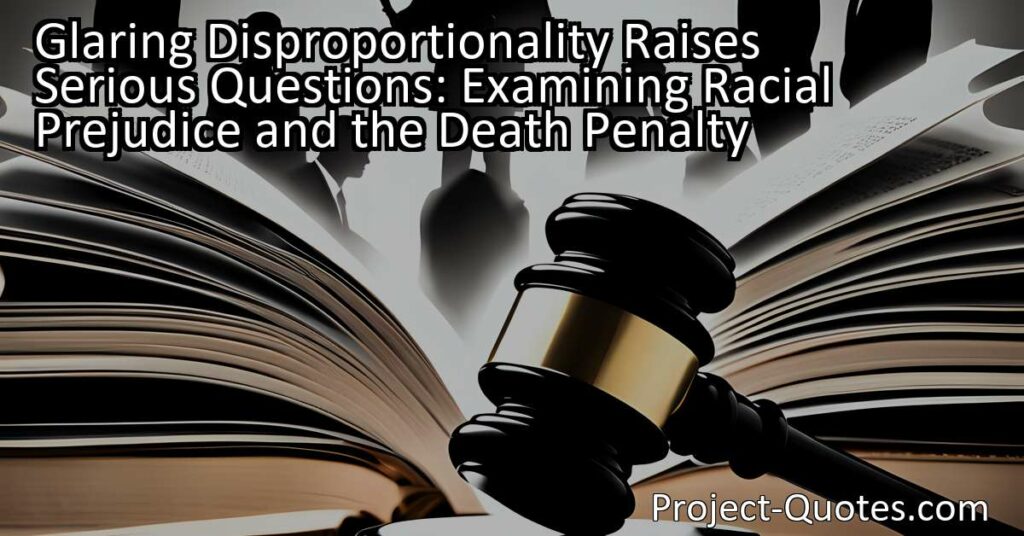The risk of racial prejudice infecting a capital sentencing proceeding is especially serious in light of the complete finality of the death sentence.
Byron White
Glaring Disproportionality Raises Serious Questions: Examining Racial Prejudice and the Death Penalty This article delves into the issue of racial prejudice within capital sentencing, highlighting the overrepresentation of minorities on death row and the potential biases that impact these cases. With statistical evidence and real-life examples, the article exposes the consequences of racial bias and emphasizes the importance of implementing safeguards to ensure a fair and just judicial system. The need for education and raising awareness is also emphasized to combat racial prejudices and strive for a more equitable future.
Table of Contents
- 1 The risk of racial prejudice infecting a capital sentencing proceeding is especially serious in light of the complete finality of the death sentence.
- 2 Byron White
- 3 Meaning of Quote – The risk of racial prejudice infecting a capital sentencing proceeding is especially serious in light of the complete finality of the death sentence.
- 4 Freely Shareable Quote Image
- 5 Related
Meaning of Quote – The risk of racial prejudice infecting a capital sentencing proceeding is especially serious in light of the complete finality of the death sentence.
Racial Prejudice and the Death Penalty: Examining the Dangers of Injustice
Introduction:
In his powerful statement, Justice Byron White exposes the grave concern of racial prejudice infiltrating capital sentencing proceedings. He highlights the undeniable gravity of the death sentence, emphasizing the imperative need for an unbiased and fair judicial system. In this article, we will delve into the inherent biases and the potential for racial prejudice that can impact capital punishment cases. We will explore real-life examples, highlight the consequences of such prejudices, and discuss the importance of implementing measures to safeguard against these unjust practices.
The Faces of Racial Prejudice:
Racial prejudice within capital sentencing can manifest itself in various forms. One of the most discernible biases is the overrepresentation of African Americans and other minorities on death row. Historically, statistics have consistently demonstrated a stark disparity in the number of individuals from minority backgrounds facing the death penalty. This glaring disproportionality raises serious questions about the fairness of the justice system.
Examining Statistical Evidence:
Researchers have uncovered alarming data that suggests racial prejudices play a significant role in capital sentencing decisions. Several studies have revealed that individuals accused of killing white victims are more likely to receive the death penalty compared to those accused of killing victims from different racial backgrounds. Such findings reinforce the fear that racial prejudices consciously or unconsciously influence the outcome of capital punishment cases, perpetuating a system riddled with injustice.
Real-Life Cases Exposing Racial Bias:
Numerous high-profile cases have shed light on the extent of racial prejudice in capital sentencing proceedings. For example, the case of Troy Davis garnered international attention, with activists arguing that racial bias played a vital role in the determination of his guilt and subsequent death sentence. Davis, an African American male, was convicted of murdering a white police officer in 1989. Despite mounting evidence suggesting his innocence, Davis was executed in 2011, further fueling the debate surrounding racial prejudices and capital punishment.
The Consequences of Unchecked Prejudice:
The repercussions of racial prejudice in the context of capital punishment are far-reaching and severe. In addition to the inherent injustice of an innocent life being taken, the perpetuation of prejudice within the judicial system perpetuates a cycle of inequality and mistrust. The negative impact on the affected communities, as well as our collective societal fabric, cannot be ignored. It is crucial to acknowledge that a system marred by racial prejudices cannot fulfill its intended purpose of justice and equal protection for all.
Safeguarding against Racial Prejudice:
Recognizing the need for reform, several measures have been proposed to mitigate the risks of racial prejudice in capital sentencing. First and foremost, it is essential to address implicit biases by providing comprehensive training to judges, prosecutors, and defense attorneys. By raising awareness of these biases, stakeholders can actively work to recognize their impact and make informed decisions that prioritize fairness.
Furthermore, reforming jury selection methods is vital to ensure diverse perspectives and eliminate racial bias. Jury pools should accurately reflect the communities from which they are drawn, ensuring that capital cases are decided by a group of individuals who represent a range of backgrounds, experiences, and perspectives.
Institutional oversight and review mechanisms should also be established to monitor the application of capital punishment, particularly focusing on identifying and rectifying any disparities that may arise due to racial prejudice. Regular assessments and audits can shed light on any systemic issues and provide an avenue for corrective action.
The Role of Education and Raising Awareness:
Another critical aspect of combating racial prejudices within capital sentencing is education and raising awareness. By educating the public, particularly young individuals, about the inherent biases that exist within our justice system, we can foster a generation that will actively work towards a more equitable future. It is essential to instill the values of fairness, equality, and justice and empower young minds to participate in the pursuit of meaningful change.
Conclusion:
Justice Byron White’s quote draws our attention to the urgent need to address racial prejudice in capital sentencing proceedings. By shedding light on the significant consequences of unfairness and prejudice, we gain a deeper understanding of the dangers inherent in the current system. To ensure justice prevails, we must work collectively to reform our capital punishment procedures, actively combat racial prejudices, and promote a fair and equitable judicial system that upholds the rights and dignity of all individuals. Through education, awareness, and advocacy, we can pave the way towards a more just society where the complete finality of the death sentence is only imposed after a truly fair trial, devoid of racial prejudice.
I hope this quote inspired image brings you hope and peace. Share it with someone who needs it today!


